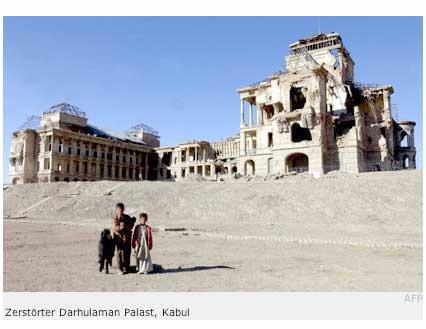


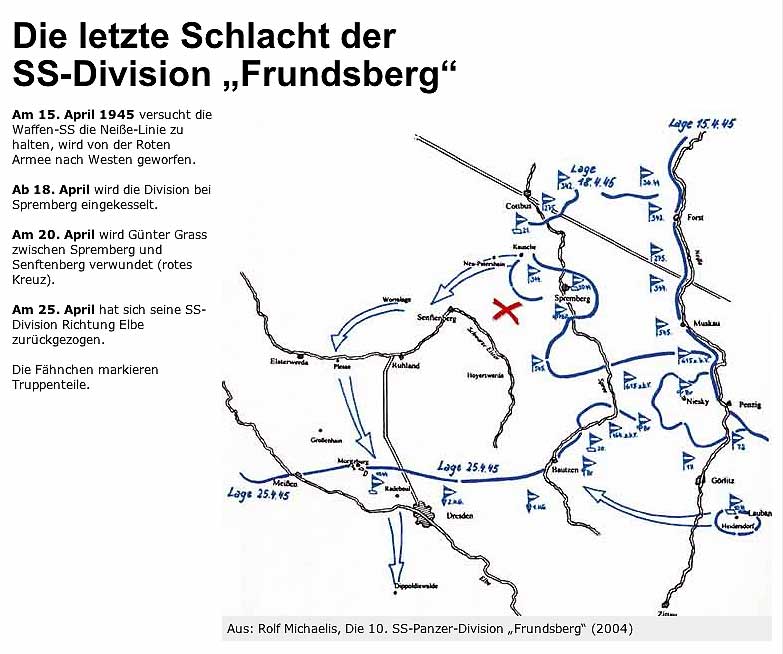
Den Zustand der Welt zitierend wurden die Stichworte der letzten Krisenherde
Afganistan
Irak
Libanon
und sonstiges unter aktuell im IN befragt
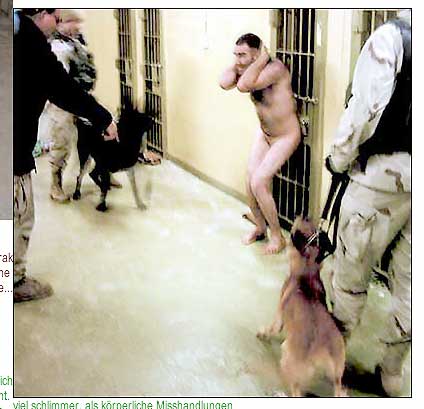
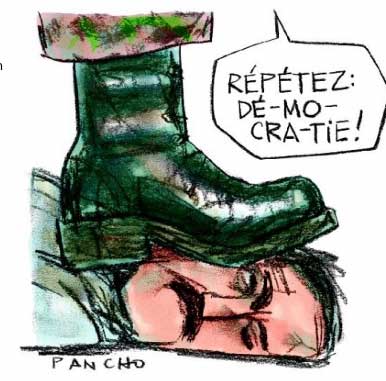
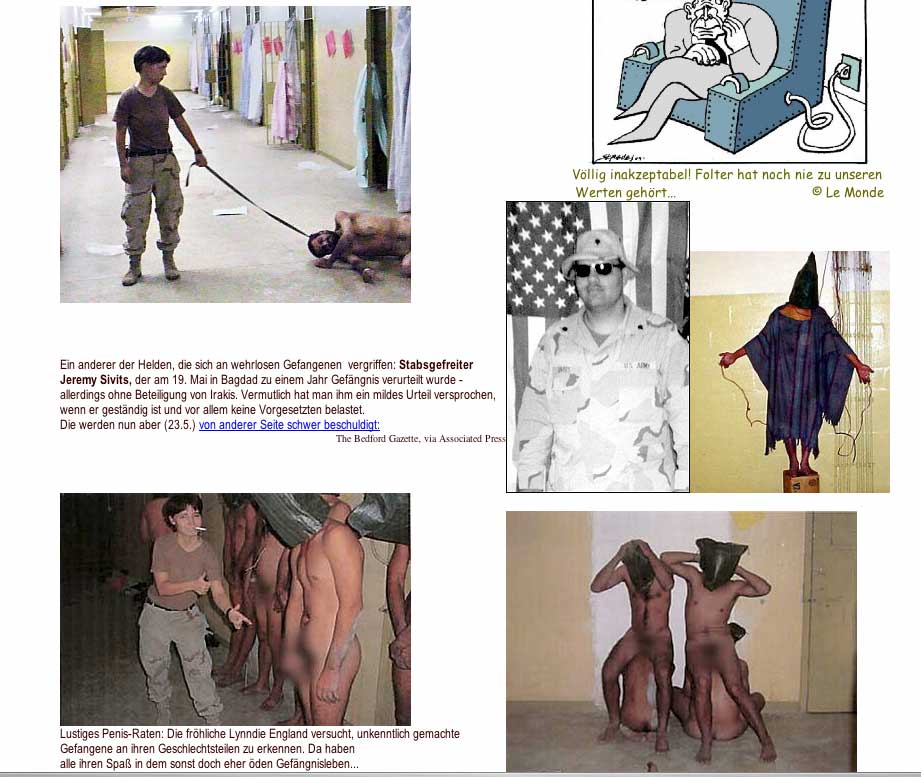
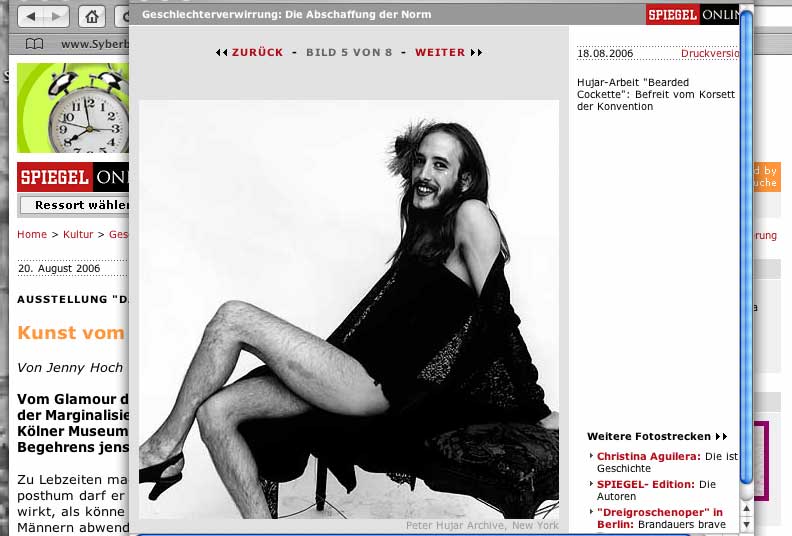
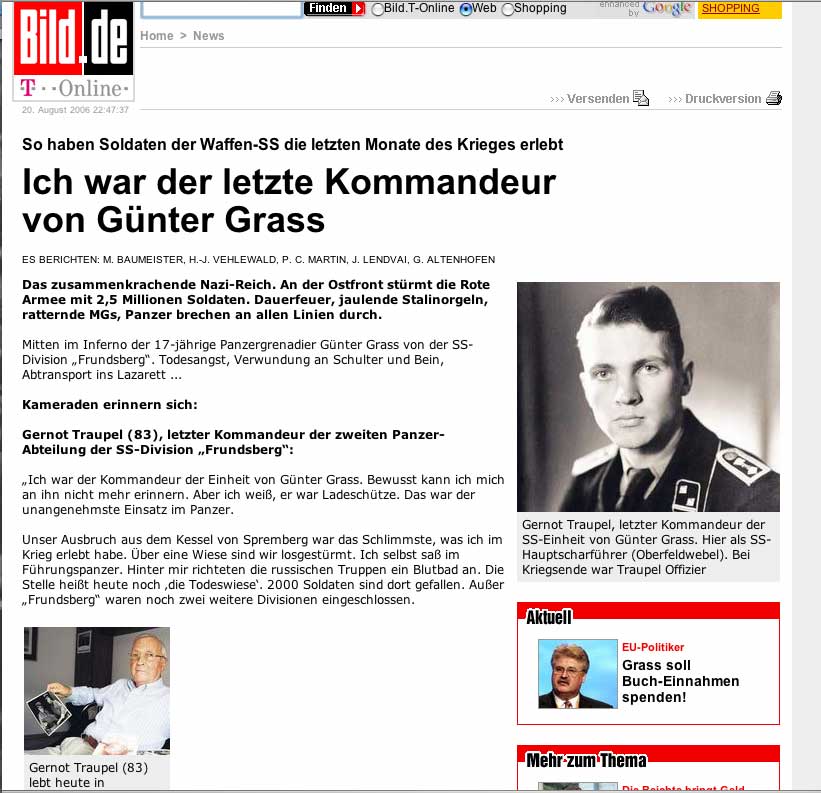
Search Books
Tools
Text-only version
Send it to a friend
Has Germany sold its post-war liberties for a mess of pottage? Sixty years
after the end of hostilities in Europe, G?nter Grass argues, global capital
has ensnared parliament, and democratic progress is in danger of becoming
a commodity to be bought and sold on the markets
Saturday May 7, 2005
The Guardian It is 60 years since the German Reich's unconditional surrender.
That is equivalent to a working life with a pension to look forward to. So
far back that memory, that wide-meshed sieve, is in danger of forgetting
it. Sixty years ago, after being wounded in the chaotic retreat in Lausitz,
I lay
in hospital with a flesh wound in my right thigh and a bean-sized shell splinter
in my right shoulder. The hospital was in Marienbad, a military hospital
town that had been occupied by American soldiers a few days earlier, at
the same
time as Soviet forces were occupying the neighbouring town of Karlsbad. In
Marienbad, on May 8, I was a naive 17-year-old, who had believed in the ultimate
victory right to the end. Those who had survived the mass murder in the German
concentration camps could regard themselves as liberated, although they were
in no physical condition to enjoy their freedom. But for me it was not the
hour of liberation; rather, I was beset by the empty feeling of humiliation
following total defeat.
Article continues When May 8 comes round again and is celebrated in complacent
official speeches as liberation day, this can only be in hindsight, especially
as we Germans did little if anything for our liberation. In the initial post-war
years our lives were determined by hunger and cold, the misery of refugees,
the displaced and bombed-out. In all four zones occupied by the wartime allies,
Britain, France, the United States and the Soviet Union, the only way to
manage the ever-increasing crush of the more than 12 million Germans who
had fled
from, or been driven out of, East and West Prussia, Pomerania, Silesia and
the Sudentenland, was to force them into our own cramped living rooms. Whenever,
and especially in a party-political sense, the question is posed, "What
can we Germans be proud of?", the first thing we should mention is this
essential achievement — even though it was forced on us. We had hardly
got used to freedom when compulsion had to be applied. As a result, in both
German states, huge long-term camps for refugees and displaced persons were
avoided. The risk of building up feelings of hate was thereby diverted, as
was the desire for revenge engendered by years of camp life which — as
today's world shows — can result in terror and counter-terror.
So, it was an achievement of a special kind. Especially since the compulsory
settlement of refugees and displaced persons had more often than not to be
carried out in the face of xenophobic resistance from the established local
population. The realisation that all Germans, not only those bombed out and
now homeless, had lost the war dawned only hesitantly. At this early stage,
in their dealings with one another, the Germans were practising that virulent
attitude towards foreigners which still exists today.
Even then there were spokespersons for the rhetoric of liberation. They appeared
individually and in groups. So many self-appointed anti-fascists suddenly
set the tone in which one was entitled to ask: how had Hitler been able to
make
headway against such strong resistance? Dirty linen was quickly washed clean,
with people being absolved of all responsibility. Counterfeiters were subsequently
busy coining new expressions and putting them into circulation. Unconditional
surrender was changed to "collapse". Although in business, law and
in the rapidly re-emerging schools and universities, even the diplomatic service,
many former National Socialists maintained their hereditary wealth, stayed
in office, continued to hold on to their university chairs and eventually continued
their careers in politics, it was claimed that we were starting from "zero
hour" or square one. A particularly infamous distortion of facts can be
seen even today in speeches and publications, with the crimes perpetrated by
Germans described as "misdeeds perpetrated in the name of the German people".
In addition, language was used in two different ways to herald the future
division of the country. In the Soviet occupied zone, the Red Army had liberated
Germany
from the fascist terror all by itself; in the Western occupied zones, the
honour of having freed not only Germany but the whole of Europe from Nazi
domination
was shared exclusively by the Americans, the British and the French.
In the Cold War that quickly followed, German states which had existed since
1949 consistently fell to one or other power bloc, whereupon the governments
of both national entities sought to present themselves as model pupils of
their respective dominating powers. Forty years later, during the Glasnost
period
it was ironically the Soviet Union that broke up the Democratic Republic,
which had by that point become a burden. The Federal Republic's almost unconditional
subservience to the US was broken for the first time when the SPD-Green ruling
coalition decided to make use of the freedom given to us in sovereign terms
60 years ago, by refusing to allow German soldiers to participate in the
Iraq
war.
"
Donated Freedom" was the title of a speech which I gave to the Berlin
Academy of Arts on May 8 1985. At the time, the country was still divided,
so I compared both states, their need for disassociation, their different dependencies,
their own particular brand of dogmatic materialism, their fear of and their
longing for unification. The "Donated Freedom" applied only to
the West German state, the Eastern one went away empty-handed.
Twenty years later, in view of the condition of the Federal Republic, now
enlarged through reunification, we question how this gift was used. Have
we dealt carefully
with the freedom which we did not win, but was given to us? Have the citizens
of West Germany properly compensated the citizens of the former Democratic
republic who, after all, had to bear the main burden of the war begun and
lost by all Germans? And a further question: is our parliamentary democracy
as a
guarantor of freedom of action, still sufficiently sovereign to take action
on the problems facing us in the 21st century?
Fifteen years after signing the Treaty of Unity, we can no longer conceal
or gloss over the fact that, despite the financial achievements, German unity
has essentially been a failure. And was right from the start. Petty calculation
prevented the government of the time from pursuing an objective grounded
in
the Constitutional Act by way of precaution, namely to submit to the citizens
of both states a new constitution relevant to the endeavours of Germany as
a whole. It is therefore hardly surprising that people in the former East
Germany should regard themselves as second-class Germans. As far as the ownership
of
manufacturing establishments, the energy supply, newspapers and publishing
are concerned, this formerly "nationally owned" fabric of the departed
state has been wound up with the occasionally criminal collusion of the privatisation
agency and ultimately expropriated. The jobless rate is twice as high as in
the former West Germany. West German arrogance had no respect for people with
East German cv's. The formerly feared migration of the population — which
led to the over-hasty introduction of the West German Deutschmark into East
Germany — is happening now, daily. Whole areas of the country, its
cities and its villages, are being emptied. After the privatisation agency
had completed
its bargain sales, West German industry and similarly the banks withheld
the necessary investment and loans and, consequently, no jobs were created.
Here,
fine exhortations are of little use. In view of this skewed situation, only
parliament, the lawmakers, can help. Which brings us back to the question
of whether parliamentary democracy is able to act.
Now, I believe that our freely elected members of parliament are no longer
free to decide. The customary party pressures, for which there may well be
reasons, are not critical here; it is, rather, the ring of lobbyists with
their multifarious interests that constricts and influences the Federal parliament
and its democratically elected members, placing them under pressure and forcing
them into disharmony, even when framing and deciding the content of laws.
Favours
minor and major smooth the way. Reprehensible scams are dismissed as sorry
misdemeanours. No one any longer takes serious exception to what is now a
sophisticated system, operating on the basis of reciprocal backhanders.
Consequently, parliament is no longer sovereign in its decisions. It depends
on powerful pressure groups — the banks and multinationals — which
are not subject to any democratic control. Parliament has thereby become an
object of ridicule. It is degenerating into a subsidiary of the stock exchange.
Democracy has become a pawn to the dictates of globally volatile capital. So
can we really be surprised when more and more citizens turn away from such
blatant scams, indignant, an tagonised and ultimately resigned and regard elections
as a simple farce and decline to vote? What is needed is a democratic desire
to protect Parliament against the pressures of the lobbyists by making it inviolable.
But are our parliamentarians still sufficiently free for a decision that would
bring radical democratic constraint? Once again the question arises, what has
become of the freedom presented to us sixty years ago? Is it now no more than
a stock market profit? Our highest constitutional value no longer protects
civil rights as a priority, and has rather been wasted at cut prices, so that
it now only serves the so-called free-market economy in line with the neoliberal
Zeitgeist. Yet this concept, which has become a fetish, barely conceals the
asocial conduct of the banks, industrial associations and market speculators.
We all are witnesses to the fact that production is being destroyed worldwide,
that so-called hostile and friendly takeovers are destroying thousands of jobs,
that the mere announcement of rationalisation measures, such as the dismissal
of workers and employees, makes share prices rise, and this is regarded unthinkingly
as the price to be paid for "living in freedom".
The consequences of this development disguised as globalisation are clearly
coming to light and can be read from the statistics. With the consistently
high number of jobless, which in Germany has now reached five million, and
the equally constant refusal of industry to create new jobs, despite demonstrably
higher earnings, especially in the export area, the hope of full employment
has evaporated. Older employees, who still had years of work left in them,
are pushed into early retirement. Young people are denied the skills for
entering the world of work. Even worse, with simultaneous complaints that
an ageing
population is a threat and the demand, repeated parrot-fashion, to do more
for young people and education, the Federal Republic — still a rich country — is
permitting, to a shameful extent, the growth of what is called "child
poverty".
All this is now accepted as if divinely ordained, accompanied at most by
the customary national grumbles. Questions as to responsibility are sent
straight
to the shunting department. Here, they are shunted first to one siding, then
then to the other. Yet the future of more than a million children growing
up in impoverished families remains in the balance. Those who point to this
state
of affairs and to the people forced into social oblivion are at best ridiculed
by slick young journalists as "social romantics", but usually vilified
as "Do-gooders". Questions asked as to the reasons for the growing
gap between rich and poor are dismissed as "the politics of envy".
The desire for justice is ridiculed as utopian. The concept of "solidarity" is
relegated to the dictionary's list of "foreign words".
Here the rich farmer and well-fed, there the nameless who seek refuge in
the soup kitchen. Here the cool better-off - there the statistically-recorded
social
problem cases. In the Federal Republic of Germany the classless society,
regarded by all as highly desirable, is changing into a class-based society
that was
long thought to be outdated. No longer a possibility but a hard fact: what
is paraded as neo-liberal proves to be on close scrutiny a return to disparaging
practices of early capitalism. And the social market economy - formerly a
successful model of economic and cohesive action - has degenerated into the
free market
economy for which the constitutional obligation of employers to contribute
to workers' pensions is an irritation and the striving for profit is sacrosanct.
When we were given freedom 60 years ago and, defeated, initially did not
know what to do with it, we gradually made use of this gift. We learned democracy
and in doing so proved star pupils — because after all we were incontrovertibly
German. With the benefit of hindsight, what was crammed into us through lectures
was enough to get us a reasonable end-of-term report. We learned the interplay
between government and opposition, whereupon lengthy periods of government
ultimately proved arid. The much lauded and reviled generation of '68 produced
new people and ultimately also tolerance. We had to acknowledge that our
burdens could not be cast aside, they are passed by parents to children and
our German
past, however much we travel and export, comes back to haunt us. Neo-Nazis
repeatedly brought us into disrepute. Even so, we felt that democracy was
here to stay. It had to withstand several challenges. Another is upon us.
After the debris had been cleared and disposed of in both German states,
reconstruction in the East proceeded under the constraints of the Stalinist
system; but in
the Western state, it took place under favourable conditions. What retrospectively
is called the "economic miracle" was not, however, due to any individual
achievement, but was won by many. Included in that number are displaced persons
and refugees, those who had in fact to start at square one in terms of material
possessions. We must not forget the contribution of foreign workers, initially
politely called "guest workers". In the rebuilding phase businessmen
were exemplary in investing every penny of profit into job creation. The
trades unions and businesses were clearly aware of the decay of the Weimar
Republic,
so they were forced to compromise and ensure social equality. However, with
so much toil and profit-chasing, the past was in danger of being forgotten.
Only in the sixties were questions asked, firstly by writers then by a youth
movement, simply called "student protest", about everything that
the older people, the war generation, would sooner forget. The protest movement
strove verbally for revolution, but was paid off with reform, for which,
often unintentionally, it had created the climate. But for it, we would still
be
living in the claustrophobic fog of the Adenauer years. Without the youth
movement, the social-liberal coalition's new Germany policy, as a gradual
convergence
of the two states, could not have been achieved.
The third challenge arose when the Wall had fallen and, on a larger scale,
the division of Europe ended, at least in terms of power politics. The two
German states had existed for four decades more against than beside each
other. As there was no willingness on the Western side to offer the East
equal rights,
the unity of the country has so far existed only on paper. It was all done
too hastily and without an understanding of what far-reaching consequences
this haste would have.
Since then, the expanded country has stagnated. Neither the Kohl government
nor the Schröder government has succeeded in correcting the initial errors.
Lately, perhaps too late, we have come to recognise that the threat to the
state — or what should be regarded as Public Enemy No 1 — comes
not from right-wing radicalism but rather, from the impotence of politics,
which leaves citizens exposed and unprotected from the dictates of the economy.
Workers and employees are increasingly blackmailed by the corporate group.
Not parliament but the pharmaceutical industry and the doctors' and chemists'
associations dependent on it decide who must profit and reap the benefit
of health reform. Instead of the social obligation which derives from owning
property,
maximising profits has become the basic principle. Freely elected MPs submit
to both the domestic and global pressure of high finance. So what is being
destroyed is not the state, which survives, but democracy.
When the German Reich unconditionally surrendered 60 years ago, a system
of power and terror was thereby defeated. This system, which had caused fear
throughout
Europe for 12 years, still leaves its shadow today. We Germans have repeatedly
faced up to this inherited shame and have been forced to do so if we hesitated.
The memory of the suffering that we caused others and ourselves has been
kept alive through the generations. We often had to force ourselves to face
this.
Compared with other nations which have to live with shame acquired elsewhere — I'm
thinking of Japan, Turkey, the former European colonial powers — we
have not shaken off the burden of our past. It will remain part of our history
as
an ongoing challenge. We can only hope we will be able to cope with today's
risk of a new totalitarianism, backed as it is by the world's last remaining
ideology.
As conscious democrats, we should freely resist the power of capital, which
sees mankind as nothing more than something which consumes and produces.
Those who treat their donated freedom as a stock market profit have failed
to understand
what May 8 teaches us every year.
Special report
Germany
Guardian Unlimited © Guardian Newspapers Limited 2006